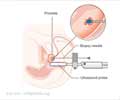The German Institute for Quality and Efficiency in Health Care (IQWiG) assessed whether adding darolutamide offers an added benefit for patients in comparison with the appropriate comparator therapy.

‘Adding darolutamide to the conventional therapy helps reduce symptoms and prevent late complications in prostate cancer patients.’
Read More..




The early benefit assessment was depending upon the data from the ongoing randomized trial ARAMIS, that compares darolutamide added to ADT with placebo treatment in combination with ADT.Read More..
Adult men with high-risk nmCRPC who either had had both testes removed or who continued their drug ADT in addition to the study medication (darolutamide or placebo) are included in the study.
It was a double-blind study until metastases or unacceptable toxicity occurred. After unblinding, the patients could choose to continue their darolutamide plus ADT treatment or receive darolutamide instead of placebo.
There were no restrictions regarding other subsequent therapies. In the benefit assessment, the first of two data cut-offs was used for all outcomes except overall survival, as analyses were not available for all included outcomes at the second data cut-off. Besides, the follow-up observation in the study is systematically shortened for all outcomes except overall survival.
In addition, a number of patients (which was unequal in the two study arms) had discontinued treatment already at the first data cut-off; and many patients switched from the placebo plus ADT arm to the darolutamide plus ADT arm after the first data cut-off.
Advertisement
The certainty of results was rated as high for overall survival and as low for all other outcomes.
Advertisement
G-BA decides on the extent of added benefit
The dossier assessment is part of the early benefit assessment according to the Act on the Reform of the Market for Medicinal Products (AMNOG) supervised by the Federal Joint Committee (G-BA). After publication of the dossier assessment, the G-BA conducts a commenting procedure and makes a final decision on the extent of the added benefit.
Source-Medindia



![Prostate Specific Antigen [PSA] Prostate Specific Antigen [PSA]](https://www.medindia.net/images/common/patientinfo/120_100/prostate-specific-antigen.jpg)





